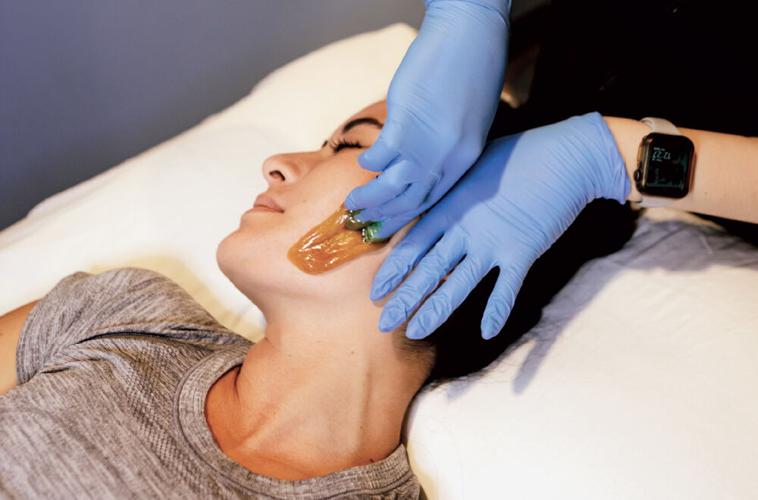
Sugar Sugar’s hair removal technique uses a paste of sugar, lemon and water.
For Aimee Blake, “wax” is akin to a curse word.
“We don’t say ‘wax.’ We have, almost like a swear jar. If you say ‘wax,’ you put a quarter in the jar,” said Blake, the founder of Sugar Sugar, a hair removal franchise that uses a technique called sugaring with a paste of sugar, lemon and water applied to the skin instead of traditional hot wax. “We own ‘sugaring’—no wax talk.”
There is one exception to the don’t-say-wax rule, noted William Johner, Blake’s husband and Sugar Sugar’s chief operating officer: “We only say ‘wax’ on the franchise website for SEO purposes.”
Search algorithms aside, the popularity of sugaring has surged in recent years as independent salons began offering the service and beauty bloggers touted the less painful, longer-lasting results of the supposed ancient Egyptian method perhaps even used by Cleopatra. “In the past 10 years of doing this, social media has really pushed sugar forward,” said Blake. “It’s all over TikTok, Reels on Instagram.”
Hype notwithstanding, Blake said the proof is in the outcomes. She used to visit a traditional waxing salon in Seattle but then tried sugaring. “I walked away from the appointment just completely in awe of the results,” she said of the treatment that didn’t irritate her skin, wasn’t as painful as waxing and led to reduced hair growth. Years later and now living in Arizona, she launched Sugar Sugar, starting with one location in Scottsdale in 2013 and adding a second in Phoenix in 2018.

Leah Gillion is a new Sugar Sugar franchisee in Philadelphia.
Sugar Sugar signed its first regional development deal in November with Leah Gillion, who plans to open three of her own locations in the Philadelphia area and also bring in franchisees who will open another seven there and in southern New Jersey. A postdoctoral fellow at the Graduate School of Education at the University of Pennsylvania, Gillion said the COVID-19 pandemic sparked a new desire for freedom and control of her schedule that prompted her to look at franchising.
“Hair removal is not something I can do myself,” she said, “and I’m not a girly-girl so I thought this is something that would appeal to lots of other men and women.”
While there are other sugaring franchises—Sugaring NYC has nearly 40 units; Sugar Me Wax has 10—Gillion said she liked that in addition to sugaring, Sugar Sugar offers other services such as organic spray tanning, facials and eyebrow tinting. “I live in the Northeast so I’m not sure how much people remove hair in the wintertime,” she said, while the spray tan will bring repeat business during otherwise slower months. “If you know anything about New Jersey, spray tanning is a service that will bring in revenue in the wintertime.”
Sugar Sugar’s use of organic and natural products was another attractive element. “I think sugaring is the future … I have really sensitive skin and it reduces breakouts for me,” said Gillion, who also pointed to the brand’s low-cost membership option with perks she said will entice customers to buy more products and services.

Founders Aimee Blake and William Johner say Sugar Sugar’s low monthly membership rate makes it easier to convert customers.
The addition of that $9.99 monthly membership was a meaningful tweak to the Sugar Sugar model before they started franchising, said Blake. Members get a 15 percent discount on services and each quarter get to try something new for free.
“It’s much easier for your employees to sell a $10 membership than $120 or $99,” said Blake. “It’s cheaper than Netflix.”
And that lower cost has “virtually eliminated cancellations,” she continued. Each corporate store has more than 1,000 members, a goal Blake and Johner said is attainable for franchisees. Other sales come from regularly priced services—a Brazilian sugaring is $65 and facials start at $80, for example—plus retail products from Sugar Sugar’s own beauty line, Skin From Scratch.
Item 19 in Sugar Sugar’s franchise disclosure document lists annual sales of $428,781 and $343,771 from its corporate locations in 2020, down from $609,007 and $407,439 in 2019. Adjusted gross profit was $270,068 and $211,563 from those two units in 2020.
The cost to open a Sugar Sugar ranges from $109,250 to $230,800.


